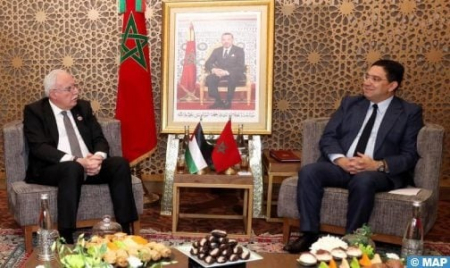Morocco Supports Yemen’s Presidential Leadership Council as Locomotive for Stability – FM
Morocco’s Foreign Minister Nasser Bourita on Tuesday voiced Morocco’s clear support for the Presidential Leadership Council of Yemen, expressing the hope that this Council will play the role of a locomotive ensuring the stability of the country. During a joint press conference with his Yemeni counterpart, Ahmad Awad bin Mubarak, at the end of their talks on the eve of the 6th Russian-Arab Cooperation Forum, Bourita recalled that “the High Instructions of His Majesty King Mohammed VI are clear in supporting our sister Yemen until it regains its security, sovereignty, and unity.” Morocco’s Minister of Foreign Affairs, African Cooperation and Moroccan Expatriates further noted that Morocco supports the Yemeni Presidential Council as the sole legitimate authority in Yemen and rejects any foreign interference and any parties jeopardizing its stability and unity. Bourita also indicated that Morocco warns against “the dangers posed by illegal armed groups operating according to the agendas of foreign countries” and expresses its categorical rejection of foreign interference in the Yemeni crisis. Morocco rejects the external support provided to the Houthis, as it contributes to instability in Yemen and the entire region, noting that the positions of the Kingdom are clear in this regard, he continued. Bourita pointed out that Morocco pays special attention to the humanitarian aspect in Yemen and constantly calls for Arab and international mobilization to address the critical humanitarian situation in the country. He emphasized the need for a comprehensive and definitive political solution so that this brotherly country can regain its security and stability. On a bilateral level, Bourita highlighted that Morocco is working to facilitate the arrival and stay of Yemeni students in Morocco, increasing the quota of dedicated scholarships to 100, along with administrative facilities to ensure students’ stay in better conditions. “We are currently working on updating the legal framework to also serve as a lever for the establishment of strong bilateral relations, reflecting the strength of the historical ties between the two countries,” Bourita concluded.

